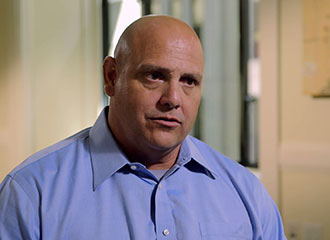A helicopter crash left John with chronic back pain and a traumatic brain injury. Swamped with painful memories, at first he turned to drinking to manage his depression. His commitment to taking care of his children gave him a reason to stop drinking and to reach out for help from VA.
LISTEN to related stories
What is chronic pain?
Do you have an injury that doesn’t seem to get better? Are you often irritable because of constant physical discomfort or pain? Does agony make it difficult to stand, walk, sit, or do everyday tasks? These can all be signs of chronic pain.
When a person experiences pain in one or more areas of the body, such as his or her neck, head, arm, or leg, for at least three to six months, it is considered chronic pain. The pain may be nagging or severe and often seems worse than short-term pain because of its prolonged duration. General wear and tear from aging as well as different types of illnesses and injuries can cause chronic pain. Some Veterans have chronic pain due to injuries that occurred in the military, such as having a phantom limb after an amputation or severe back or spinal cord damage after an accident. Other times, it can be hard to figure out the source of long-term pain.
Many times, injuries suffered in training or during deployment may seem to have healed, but as you age, they can reemerge and become a source of chronic pain.
Many people experience chronic pain at some point in their lives. Chronic pain can hinder or even prevent common, day-to-day activities like sitting, standing, and waiting in line. Many people who deal with chronic pain find the constant experience of pain and the restrictions it places on their daily activities makes them feel down, irritable, or hopeless. Some people become depressed if they think the pain will never end and there is nothing they can do about it.
“In combat, I had no other option than to ‘suck up’ the pain and ‘drive on.’ But now that I’m back, it’s a relief to know there are ways for me to cope with it.”
When it comes to chronic pain, you don’t have to just live with it. Depending on what’s causing the pain, there are various options for chronic pain treatment, such as:
- Physical therapy to increase your level of pain-free activity
- Therapy or counseling to change the way you relate to or cope with your pain
- Relaxation techniques to manage the stress of chronic pain
- In some cases, advanced medications to reduce the level of severe pain
“Dealing with pain is something I’m used to. I did it for years. What I wasn’t used to is the way it affected my mood and overall energy level. My wife was tired of watching me suffer and you know what? So was I.”
If you are experiencing chronic pain, there are a few things you can do to deal with your symptoms and improve your well-being:
- Tell your doctor about it. He or she can help develop a treatment plan for you
- Educate yourself on your condition so you can decide on the best options for managing your pain
- Keep a “pain diary,” where you can record your progress with pain and how it affects your life
- Find ways to stay physically active, according to the recommendations of your doctor
Your friends and family members have likely noticed that your chronic pain is affecting your life. Talking to them can be especially helpful as you look for the type of chronic pain treatment that is right for you.
Every day, Veterans who served in the Army, Marine Corps, Navy, Air Force, and Coast Guard connect with effective treatments for chronic pain management and chronic pain support resources. If chronic pain is affecting your well-being or getting in the way of your relationships, work, or daily activities, you may want to reach out for support. Consider connecting with:
- Your family doctor: Ask if your doctor has experience treating Veterans or can refer you to someone who does
- A mental health professional, such as a therapist, who can provide you with effective ways to cope with your pain
- Your local VA Medical Center or Vet Center: VA specializes in the care and treatment of Veterans and has clinics and programs dedicated to pain management and treatment
- A spiritual or religious advisor
VA Medical Center Facility Locator
Chronic pain may be a sign of health conditions that need attention. This website will allow you to search for VA programs located near you. If you are eligible to receive care through the Veterans Health Administration, you can enroll in one of VA’s treatment programs.
http://www2.va.gov/directory/guide/home.asp?isflash=1
Vet Center
If you are a combat Veteran or experienced any sexual trauma during your military service, bring your DD214 to your local Vet Center and speak with a counselor or therapist—many of whom are Veterans




